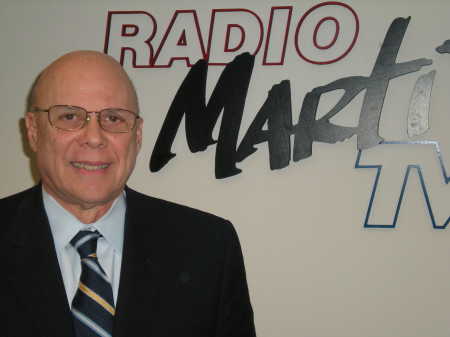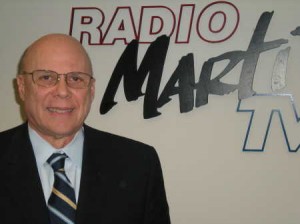
Still MAD after all these years
MIAMI – “Who won the Cuban Missile Crisis?” asks Pedro Roig in the October 28 edition of the Miami Herald. Roig is identified, among a plethora of other titles (historian, lawyer, author, Bay of Pigs veteran), as a senior research associate at the Institute for Cuban and Cuban American Studies (ICCAS) at the University of Miami. Absent from this long list is Roig’s most recent and highest profile job by far, director of Radio and TV Martί. A curious omission.

This column is not meant as a personal attack against Pedro Roig. Hatchet jobs and ad hominem arguments are not part of my DNA as a social scientist or opinion writer. The main focus of this article is an analysis of the content of Roig’s Herald piece, which I think reflects the mindset of many in the traditional exile and which can be described in a single word: MAD.
At the same time, in evaluating the validity, objectivity, and integrity of an opinion piece like Roig’s, unlike that of a physics or chemistry paper, it would be malpractice to fail to consider the source. Moreover, in general, and especially in this case, it is essential to dissect not only what is said but what is not said.
ICCAS presents itself as a center for academic analysis of Cuba and the Cuban American population. Radio and TV Martί are U.S. government stations that beam a mixture of information, entertainment and propaganda to Cuba with the purpose of undermining the Cuban regime. Evidently, mentioning Roig’s role as the chief of those stations would raise questions about the author’s credibility and capacity for objectively as well as the status of ICCAS as a legitimate academic center.
Another factor that could damage the credibility of both the author and the institution that hired him when Roig left his choice radio job in 2011 (through resignation or firing depending on the source) is the fact that the Martίs are a boondoggle. Over the years, the American taxpayer has doled out more than $500 million for the broadcasts, which have made no detectable dent in the stability or the policies of the Cuban government. Moreover, as the Miami Herald has accurately reported, the operation “has been dogged by complaints of meager audiences, biased politics and journalism and cronyism.”
The Roig column itself reflects many of the defects that plague both the author’s ID and the stations he led: deception by omission, selective evidence, biased analysis, shoddy reading of the relevant literature and of the historical record.
To concentrate on the key point, what has been the main conclusion reached by the vast majority of historians, political analysts, and participants themselves regarding the missile crisis and its resolution?
The clear consensus is that the Cuban Missile Crisis was the single most dangerous event of the Cold War and possibly of human history. Specialists on the topic have described the moment as one of being “on the brink” of a nuclear war and the possible annihilation of hundreds of millions of people or even of the entire species. Jonathan Schell has taken the scenario one further step: an all-out nuclear war would shoot so much dust and debris into the atmosphere that it would blot out the sun creating a nuclear winter that might destroy all life on the planet. Yet, incredibly, you can read Roig’s piece word-for-word without finding a hint of this most terrifying and significant aspect of the crisis.
This gigantic omission is no more accidental than the stuff about Radio/TV Martί. To have described the possible consequences of the crisis would have run counter to the banal conclusion Roig’s demented analysis is leading to from the outset. For, when you consider the horror averted through diplomacy, the real answer to Roig’s query is obvious. Civilization won the Missile Crisis. The human species won the Missile Crisis. The Earth won the Missile Crisis. Whatever you think of Kennedy, he will always be remembered for avoiding a second holocaust even more devastating than the first. It was his finest moment.
But that is not the conclusion Roig wants to reach. Instead, he wants to talk about how many more nuclear weapons the United States had in 1962 than the Soviets. The implication is that the United States could have won the Missile Crisis by dint of its strategic military superiority. When Roig describes what happened on Oct 27, 1962, namely that “the U.S. military began the final stage of a massive deployment for the attack on Castro’s Cuba,” it’s not difficult to guess that this would have been his preferred outcome.
Somehow, though, he forgets to mention that once U.S. troops had hit the beaches they would have encountered a Soviet brigade armed with tactical nuclear weapons and the authority to use them. What would the United States have done if massive numbers of U.S. troops had been killed by Soviet soldiers using nuclear weapons? That is how world wars begin.
Who won the Missile Crisis, according to Roig? His prebaked and half-baked answer is that Castro won the Cuban Missile Crisis. Why? Well, Khrushchev was deposed less than two years later. And “Kennedy was murdered a year later by a pro-Castro assassin.” Fidel? He lived to rule Cuba for nearly half a century.
Never mind that these dots are at best tenuously connected, with the likely exception of the link between the Missile Crisis and Khrushchev’s downfall. But if that link is real, it implies that Soviet leaders believed Kennedy was not weak as Roig implies and won the Missile Crisis over Khrushchev.
Moreover, Oswald’s actions had nothing to do with the Missile Crisis. While Oswald was a disturbed individual, it is also true that he loathed the campaign of invasions, aggressions, and attempted assassinations the Kennedy administration was carrying out against Cuba. That loathing, along with his pathological mental state, were likely the major reasons for the assassination. But plenty of people abhorred U.S. policy toward Cuba but none tried to kill Kennedy; they were in their right minds. By calling Oswald a “pro-Castro assassin,” Roig purposefully leaves the false impression that Castro had something to do with the assassination.
The mindset expressed by Roig is truly mad. The U.S. and Soviet strategic doctrine during the Cold War was Mutual Assured Destruction (MAD). This could easily have been the tragic outcome if Kennedy had deferred to the military and decided “to take out Castro” in 1962 as many exiles (including probably Roig) still wish he had done. Only an insane mindset would hold that it would have been worth risking the horrors of nuclear war just to overthrow Fidel Castro. Finally, the hard-line exile mindset is warped by an anger so blazing that it burns its own. You have to be really, really mad to advocate a policy that, at a minimum, would have led to the death of hundreds of thousands or even millions of your fellow Cubans.

